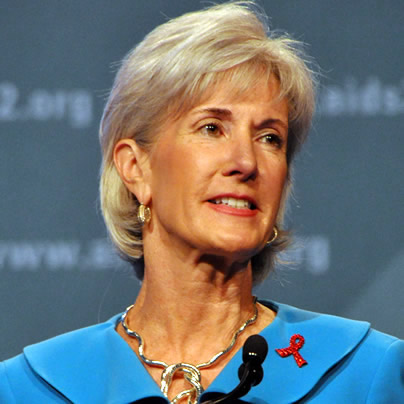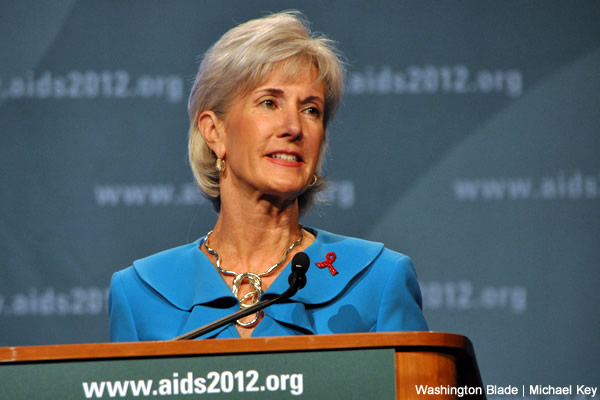Politics
White House to hold LGBT briefing on ‘Obamacare’
Sebelius to keynote event Sept. 12 to build support for law


Secretary of Health & Human Services Kathleen Sebelius is set to keynote a White House briefing on health care reform set for Sept. 12. (Blade file photo by Michael Key).
As the administration works to implement health care reform, the White House has scheduled a briefing for LGBT advocates on Sept. 12 to discuss ways “Obamacare” will impact LGBT people, according to an invitation to the event.
The email invitation, which is dated Aug. 20 and signed by LGBT liaison Gautam Raghavan, was apparently delivered to leaders within the LGBT community that support President Obama. It says Secretary of Health & Human Services Kathleen Sebelius will deliver a keynote address at the briefing.
The administration is also set to provide an overview of the Affordable Care Act in addition to talking about key provisions related to the LGBT community and the enrollment effort for health insurance exchanges.
“As you know, many members of the LGBT community face limited access to health care and insurance, and are less likely to get the preventive care they need to stay healthy,” the invite states. “The Affordable Care Act directly addresses some of these needs, and the upcoming open enrollment period provides an important opportunity to get folks enrolled — and transform the health and well-being of the LGBT community for generations to come.”
Neither the White House nor the Department of Health & Human Services would immediately respond to the Washington Blade’s request for confirm on the briefing or answer questions about it. It’s unclear exactly who was invited to the briefing or how many people would attend. It doesn’t appear to be open to the public or the press.
According to the invitation, the administration will also provide a presentation of important new research on how LGBT communities perceive and access health care and suggest messaging strategies for reaching key sub-communities. The briefing is also set to include a panel discussion of best practices by community organizations engaged in LGBT health advocacy as well as breakout sessions to connect local leaders and plan regional enrollment events.
The invitation emphasizes the need of LGBT supporters to educate others on the importance of implementing Obamacare.
At the beginning of next year, the health care exchanges and the individual mandate under the law are scheduled to begin. That’s also the time when insurers will be prohibited from discriminating against or charging higher rates for individuals based on pre-existing medical conditions or gender, which has been interpreted to include protections for LGBT people.
“YOU are critically important to the education and enrollment effort, and this briefing is designed to equip community leaders like you with the tools, information, and resources you need to get involved and help your local communities get access to quality, affordable health care,” the invitation states. “We want your help! We hope you will leave this briefing and return to your community empowered and inspired to partner with us in the months and years ahead.”
The White House is holding this briefing amid a larger public relations push to build support for Obamacare, which is still viewed unfavorably by 54 percent of the American public, according to a poll this month from Rasmussen. Last month, President Obama held an event at the White House and spoke out about the importance of implementing the health care reform.
“We’re going to keep on working to make sure many people around this country who are already paying premiums are getting cheaper prices, that the money is being actually spent on their health care, that you’re not having to worry about the fine print, and that if you don’t have health insurance, you finally are in a position to get some at an affordable price — to give you and your family the kind of security you deserve,” Obama said at the time.
Congress
Congress passes ‘Big, Beautiful Bill’ with massive cuts to health insurance coverage
Roughly 1.8 million LGBTQ Americans rely on Medicaid

The “Big, Beautiful Bill” heads to President Donald Trump’s desk following the vote by the Republican majority in the U.S. House of Representatives Thursday, which saw two nays from GOP members and unified opposition from the entire Democratic caucus.
To partially offset the cost of tax breaks that disproportionately favor the wealthy, the bill contains massive cuts to Medicaid and social safety net programs like food assistance for the poor while adding a projected $3.3 billion to the deficit.
Policy wise, the signature legislation of Trump’s second term rolls back clean energy tax credits passed under the Biden-Harris administration while beefing up funding for defense and border security.
Roughly 13 percent of LGBTQ adults in the U.S., about 1.8 million people, rely on Medicaid as their primary health insurer, compared to seven percent of non-LGBTQ adults, according to the UCLA School of Law’s Williams Institute think tank on sexual orientation and gender identities.
In total, the Congressional Budget Office estimates the cuts will cause more than 10 million Americans to lose their coverage under Medicaid and anywhere from three to five million to lose their care under Affordable Care Act marketplace plans.
A number of Republicans in the House and Senate opposed the bill reasoning that they might face political consequences for taking away access to healthcare for, particularly, low-income Americans who rely on Medicaid. Poorer voters flocked to Trump in last year’s presidential election, exit polls show.
A provision that would have blocked the use of federal funds to reimburse medical care for transgender youth was blocked by the Senate Parliamentarian and ultimately struck from the legislation — reportedly after the first trans member of Congress, U.S. Rep. Sarah McBride (D-Del.) and the first lesbian U.S. senator, Tammy Baldwin (D-Wis.), shored up unified opposition to the proposal among Congressional Democrats.
Congress
Ritchie Torres says he is unlikely to run for NY governor
One poll showed gay Democratic congressman nearly tied with Kathy Hochul

Gay Democratic Congressman Ritchie Torres of New York is unlikely to challenge New York Gov. Kathy Hochul (D) in the state’s next gubernatorial race, he said during an appearance Wednesday on MSNBC’s “Morning Joe.”
“I’m unlikely to run for governor,” he said. ““I feel like the assault that we’ve seen on the social safety net in the Bronx is so unprecedented. It’s so overwhelming that I’m going to keep my focus on Washington, D.C.”
Torres and Hochul were nearly tied in a poll this spring of likely Democratic voters in New York City, fueling speculation that the congressman might run. A Siena College poll, however, found Hochul leading with a wider margin.
Back in D.C., the congressman and his colleagues are unified in their opposition to President Donald Trump’s signature legislation, the “Big Beautiful Bill,” which heads back to the House after passing the Senate by one vote this week.
To pay for tax cuts that disproportionately advantage the ultra-wealthy and large corporations, the president and Congressional Republicans have proposed massive cuts to Medicaid and other social programs.
A provision in the Senate version of the bill that would have blocked the use of federal funds to reimburse medical care for transgender youth was blocked by the Senate Parliamentarian and ultimately struck from the legislation, reportedly after pressure from transgender U.S. Rep. Sarah McBride (D-Del.) and lesbian U.S. Sen. Tammy Baldwin (D-Wis.).
Torres on “Morning Joe” said, “The so-called Big Beautiful Bill represents a betrayal of the working people of America and nowhere more so than in the Bronx,” adding, “It’s going to destabilize every health care provider, every hospital.”
Congress
House Democrats oppose Bessent’s removal of SOGI from discrimination complaint forms
Congressional Equality Caucus sharply criticized move

A letter issued last week by a group of House Democrats objects to Treasury Secretary Scott Bessent’s removal of sexual orientation and gender identity as bases for sex discrimination complaints in several Equal Employment Opportunity forms.
Bessent, who is gay, is the highest ranking openly LGBTQ official in American history and the second out Cabinet member next to Pete Buttigieg, who served as transportation secretary during the Biden-Harris administration.
The signatories to the letter include a few out members of Congress, Congressional Equality Caucus chair and co-chairs Mark Takano (Calif.), Ritchie Torres (N.Y.), and Becca Balint (Vt.), along with U.S. Reps. Nikema Williams (Ga.), Hank Johnson (Ga.), Raja Krishnamoorthi (Ill.), Delia Ramirez (Ill.), Joyce Beatty (Ohio), Lloyd Doggett (Texas), Eleanor Holmes Norton (D.C.), Josh Gottheimer (N.J.), and Sylvia Garcia (D-Texas).
The letter explains the “critical role” played by the EEO given the strictures and limits on how federal employees can find recourse for unlawful workplace discrimination — namely, without the ability to file complaints directly with the Employment Opportunity Commission or otherwise engage with the agency unless the complainant “appeal[s] an agency’s decision following the agency’s investigation or request[s] a hearing before an administrative judge.”
“Your attempt to remove ‘gender identity’ and ‘sexual orientation’ as bases for sex discrimination complaints in numerous Equal Employment Opportunity (EEO) forms will create unnecessary hurdles to employees filing EEO complaints and undermine enforcement of federal employee’s nondiscrimination protections,” the members wrote in their letter.
They further explain the legal basis behind LGBTQ inclusive nondiscrimination protections for federal employees in the EEOC’s decisions in Macy v. Holder (2012) and Baldwin v. Foxx (2015) and the U.S. Supreme Court’s decision in Bostock v. Clayton County (2020).
“It appears that these changes may be an attempt by the department to dissuade employees from reporting gender identity and sexual orientation discrimination,” the lawmakers wrote. “Without forms clearly enumerating gender identity and sexual orientation as forms of sex discrimination, the average employee who experiences these forms of discrimination may see these forms and not realize that the discrimination they experienced was unlawful and something that they can report and seek recourse for.”
“A more alarming view would be that the department no longer plans to fulfill its legal obligations to investigate complaints of gender identity and sexual orientation and ensure its
employees are working in an environment free from these forms of discrimination,” they added.


















